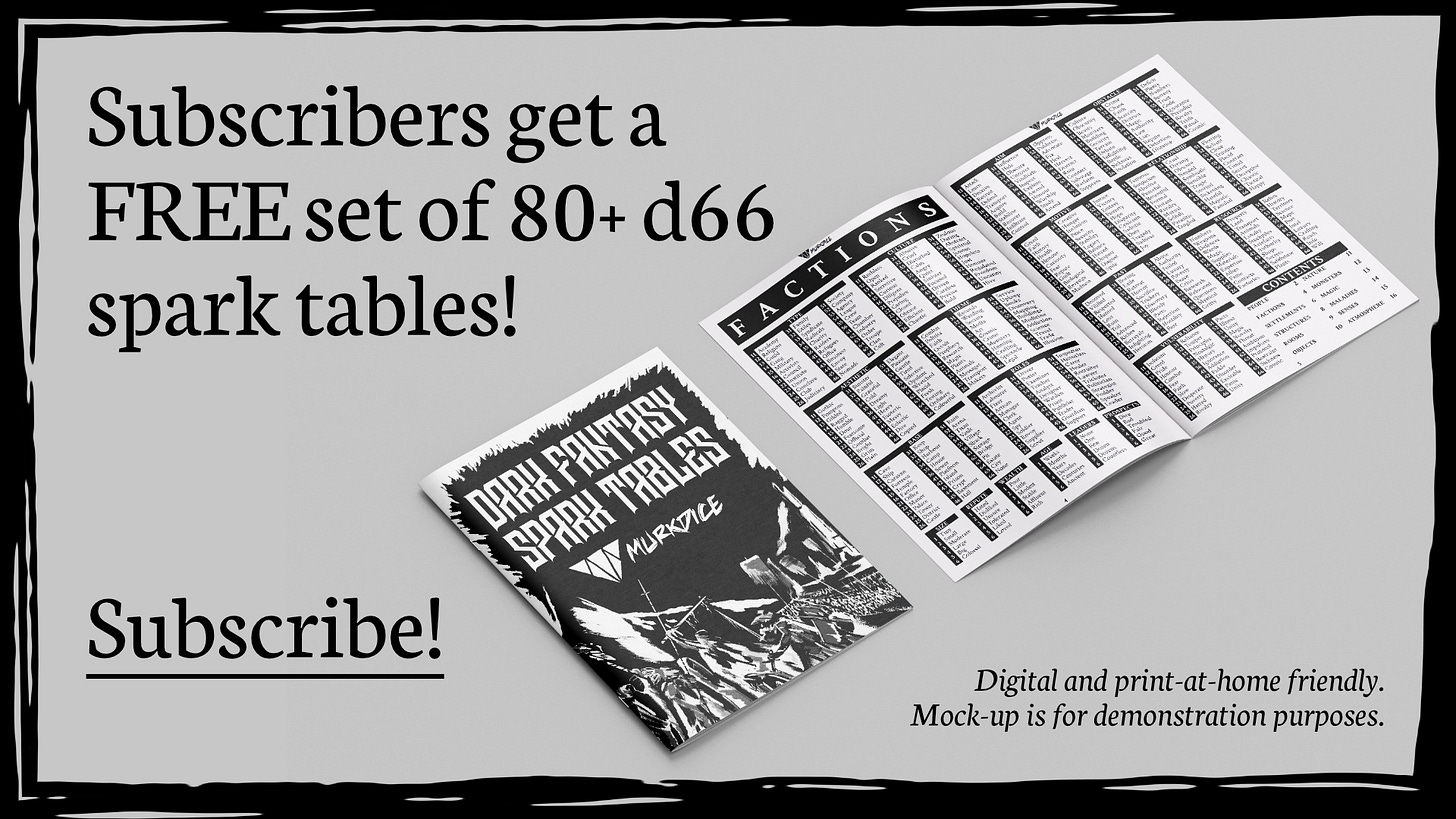On your honour (tables)
Mechanising knights' reputations
This article contains affiliate links, meaning I get a commission if you make purchases using these links, at no cost to you.I’m prepping to run Chris McDowall’s Mythic Bastionland ~I told myself I would wait for the hardcopy but here I am~
I like Luke Gearing’s reputation table. I want to connect them with the structure of myths in Mythic Bastionland. So I’ve cross-polinated them to make a variation of reputation tables I’m calling ‘honour tables’.
You can twist this idea to suit any system. It would work well with Cairn 2e, the original Into the Odd, Mork Borg (I like the idea of using this with Tephrotic Nightmares), or even modern stuff like Cy_Borg or Death in Space. ~it works for our FREE hack Blades into the Odd as well~
Reputation
Gearing’s idea is to put PC actions (e.g. you killed a well-regarded knight in battle) in a ‘reputation table’.
When determining reactions of NPCs approached by PCs, you roll on the reputation table. If you roll on an empty entry, the NPC bases their reaction on the PCs initial presentation. If a PC action is rolled on the table, the NPC reaction is based on their view of the action.
A queen may look less favourably on the slaying a knight who could have been taken prisoner and ransomed. The leader of a raider clan may regard it as a positive trait.
Gearing suggests splitting these geographically or by factions.
We’re going to twist this into honour tables.
Myths & Omens
I want to use this idea of reputation in my game of Mythic Bastionland so I’m tying it to the core idea of Myths and Omens in the game.
Mythic Bastionland features Myths, which are a sort of quest. Myths have Omens which are events that happen as a Myth progresses, like pieces of a quest. This is like other games where players have objectives which are achieved through a string of actions leading to an outcome.
Myths and Omens are how our knights will fill honour tables.
Holding based honour tables
A typical region in Mythic Bastionland has 4 larger settlements called Holdings. So I’m thinking that each Holding could have a d20 ‘honour table’.
When the knights take action relating to an Omen, it is added to the table of the nearest Holding if:
There are witnesses who talk. The entry on the table may reflect the perceptions of that individual (who could choose to spread believable lies).
The knights spread the word themselves. The effect of the telephone game may come up.
Both may occur. In this case, put both in the table.
Omens are added to the bottom of the table (e.g. start at 1). Slayed Ser Falterver at the tourney in Dalton.
When the knights resolve a Myth, add to the tables of all Holdings (if the knights or witnesses talk). Myth entries are added at the top of the tables (e.g. start at 20). Calmed the Griffon by restoring its nest on the pale peak. A jealous knight who did not climb the peak in time claims they made a wicked deal with the beast.
Conflict between the knights and witnesses might be resolved in a court (which may remove entries from an honour table).
To roll NPC reactions, choose whether to roll on the honour table for the Holding nearest to the PCs or the honour table for the Holding the NPCs represent.
Go forth, gain honour
This can be twisted to fit any game with little effort, and can provide additional information to inform interactions with NPCs. You can centre around factions instead of regions if you desire (I think it would work well with my approach to factions), or use both. The flavour here is of honour, but it can be anything you want really - how brutal your gang is; how genius your science team is.
It follows the NSR/OSR tradition of showing players how they are affecting the world, whilst giving you the GM more fuel for the social interaction furnace. I’m going to combine this with my Reaction Table Overhaul, to give me a ton of info for the starting conditions of social encounters.
If you like this article, please like and share! Commenting helps out MurkMail a lot and I love chatting with you folks. Come chat on the discord.
Recommendations
MurkMail+: We launched our paid tier last week! Don’t forget to check out the free sample to see what goodies you can get if you upgrade your subscription! (spoilers: discussion, prose, and a d6 table twice a month).
YouTube: Matt Colville released another video on DnD history. A big focus is on how rules hacking was essential to the development of ttrpgs, which as you can imagine MurkMail wholeheartedly supports. I learnt a lot from this video, perhaps you’ll learn something too!




Never thought of this before, but of course, a person’s actions will change how people perceive them 😊